St. Olaf College Spotlights Two Years of Projects for Peace
by Anna Brown
Funded Projects, Partner Institutions, Americas, Middle East & North Africa, Africa, Education, Health & Well-being, Human Rights & Justice, Livelihoods, Youth
This article originally appeared in the St. Olaf College Newsroom.
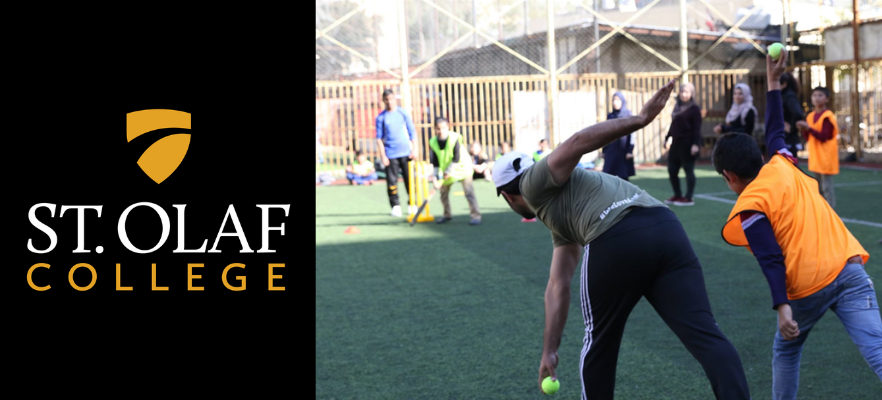
Three recent St. Olaf College graduates received grants from the Davis Project for Peace initiative as students to design and implement their own grassroots projects promoting peace around the world.
Manuela Novoa-Villada ’21 is a 2021 recipient and used the $10,000 in funding to create virtual and in-person workshops on integral sex education in Colombia. Maha Abadi ’20 and Marie-Simone Kadurira ’20 are 2020 recipients. Abadi hosted summer schools focusing on human development through education in Lebanon, while Kadurira’s project focused on distributing reusable menstrual products to women in Zimbabwe. Due to COVID-19, Abadi and Kadurira received their awards during Summer 2021.
The Davis Project for Peace award is a grant given to undergraduate students who use creativity, innovation, and social entrepreneurship to develop a unique project that focuses on conflict resolution. The award was founded by philanthropist Kathryn Wasserman Davis, who challenges today’s students to do what previous generations could not — to work effectively toward lasting peace in the world.
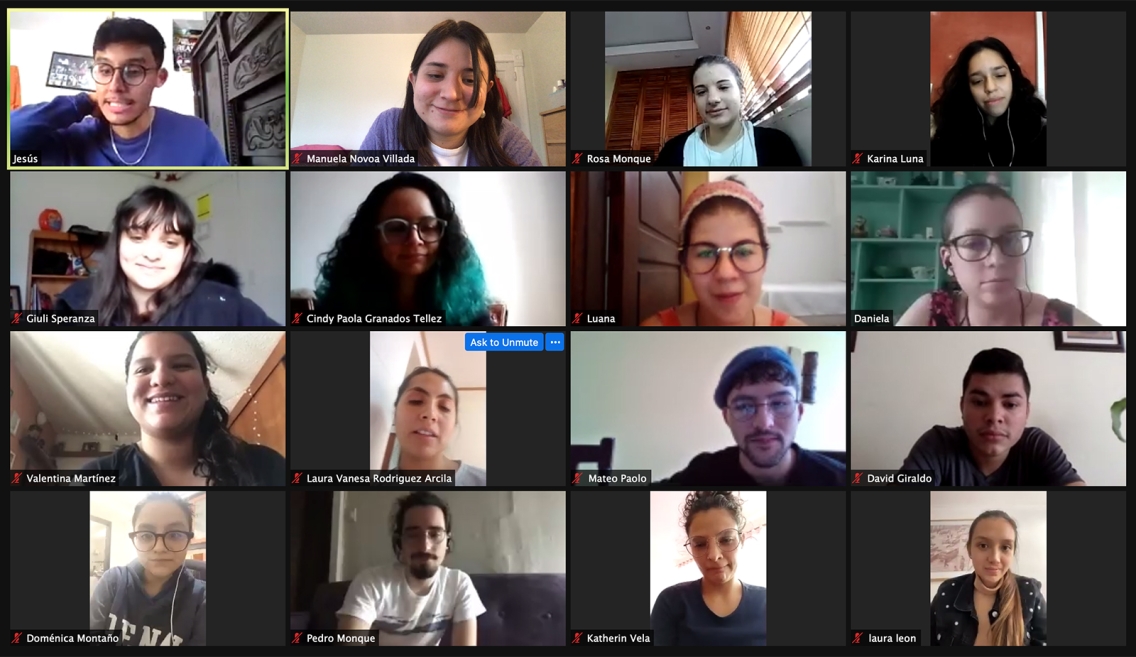
Manuela Novoa-Villada ’21: Jóvenes Sin Tabú
Novoa-Villada’s project, Jóvenes Sin Tabú, which translates to Youth Without Taboos, was inspired by a conversation she had with Jesús Pinzón Ulloa about the lack of sex education they both received in schools in Colombia. Pinzón, who was Novoa-Villada’s supervisor during an internship, worked with Novoa-Villada on creating a three-week summer camp focused on sexual and gender justice. Participants were immersed in activities covering interdisciplinary topics like femicide, domestic and sexual violence, consent, and LGBTQIA+ rights, among others.
“In 2016 the government made sex education mandatory in secondary schools. However, that could mean many things; they left it up to the schools to decide what sex education means,” Novoa-Villada says. “Jesús Pinzón Ulloa and I started to work on designing a project that would address that lack in curricula, specifically in sex education at schools. We thought that it needed to have more inclusive perspectives. We thought that bringing information to students about the different types of taboos that we have in the country is important to move forward in improving sex education curricula in Colombia.”
During the three weeks, five virtual workshops were held on topics such as violence in sex-affective relationships; territoriality and dissidence; sexual violence; reproductive and sexual rights; and assertive communication, consent, and sexual assault. Two in-person workshops were also held in two different schools in Urabá, Colombia: San José La Salle School of Turbo, and Cadena de Las Playas school of Apartadó.
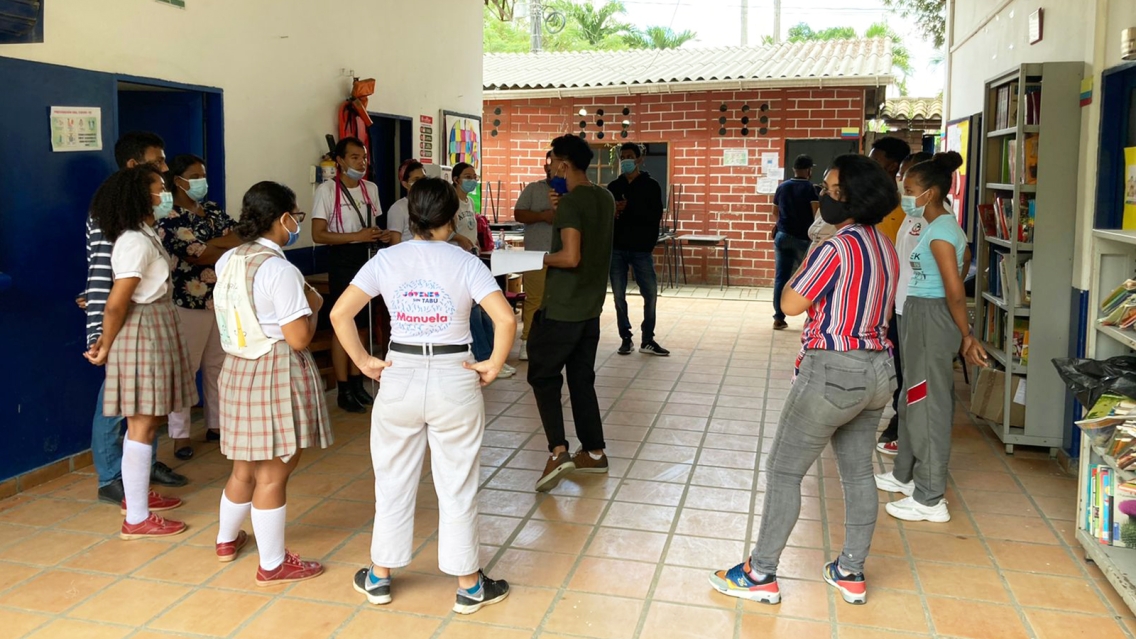
In addition to Novoa-Villada and Pinzón, there were 30 volunteers who had been working on the project. This included creating social media content to advertise the virtual workshops, preparing the logistics for facilitators to travel to Urabá, and connecting with “Empoderhadas” to coordinate in-person workshops.
For participants in the workshops, Novoa-Villada was looking for leaders with diverse identities and experiences. “We’re defining leadership not in the traditional sense of who has the most accomplishments, but more showing an interest in motivating people to do something in their schools,” she says. “None of the volunteers were experts in sex education, so we were learning together and trying to understand where our prejudices are coming from and how we can address those prejudices together.”
We thought that bringing information to students about the different types of taboos that we have in the country is important to move forward in improving sex education curricula in Colombia.
Novoa-Villada is appreciative of all of the hard work that has been put into designing and implementing this project, which has transformed into something bigger than a summer project.
“All the work that we did was possible because of the help of all 30 volunteers that we had and the help of the other coordinator, Jesús Pinzón Ulloa,” she says. “It turned into a collective of people who want to work for sexual diversity and gender justice, especially in academic settings and sex education curricula. Jóvenes sin Tabú (Youth without Taboos) became a collective with the vision to be an organization in the future, which is proposing community-based pedagogical practices that want to change the way sex education is taught by incorporating queer, antiracist, anti/ableist, and decolonial perspectives into sex education.”
For more information, visit Jóvenes Sin Tabú’s official Facebook and Instagram pages.
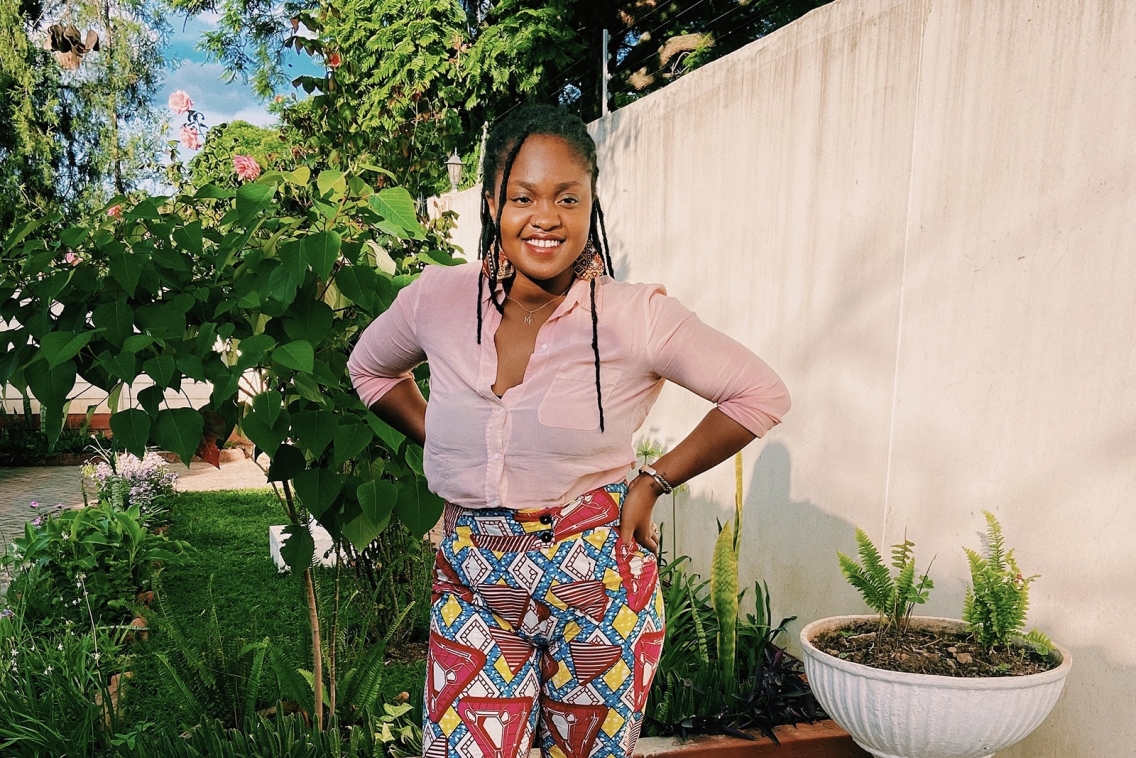
Marie-Simone Kadurira ’20: Vasikana Vedu
Kadurira has always known that she wanted to use her education to give back to her home country, Zimbabwe. She started applying for the Davis Projects for Peace grant during her sophomore year and received the award two years later for her project, Vasikana Vedu.
“Addressing period poverty has always been something that I knew that I wanted to do,” Kadurira says. “Even in the degrees that I chose and the things that I was immersing myself in when I did my undergraduate degree, it was very much coming from a point of ‘I want to learn as much as I can about the systems that dictate how people move and how people govern themselves so that I can come back home and make a difference.’”
Vasikana Vedu empowers women and girls in Zimbabwe by providing them with reusable, sanitary products for their menstrual cycles. According to Kadurira, period poverty is really pervasive in sub-Saharan Africa, resulting in many girls missing school. Consequently, this limits their access to education and opportunities that allow females to develop themselves and their communities. Kadurira strives to provide women access to the resources and information that will allow them to look beyond their basic needs.
“My goal was, first and foremost, to reach as many women as possible within the timeframe that I had. It’s also really important to start the conversation around menstrual and reproductive health because, in the context of Zimbabwe, there is a purity culture, so women don’t talk about their reproductive health, which is so integral to their well-being,” Kadurira says. “I want people to know what Vasikana Vedu is, not necessarily just to know me, but to know our mission so people are more inclined to talk about the different intersections that I’m trying to honor like climate and reproductive justice.”
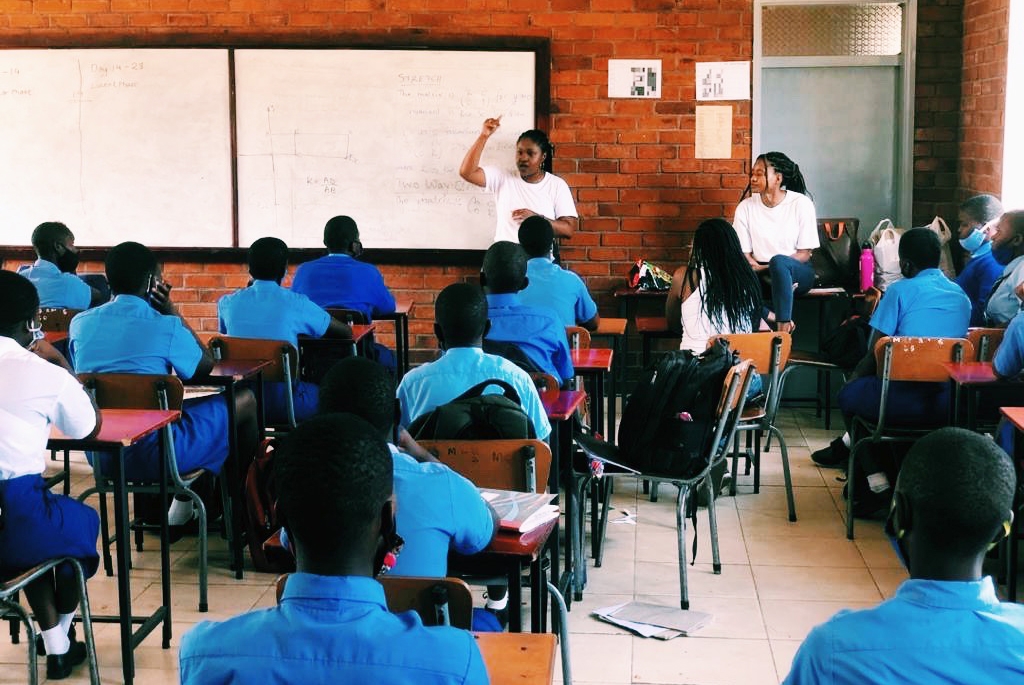
For the past two years, Kadurira has been creating partnerships and expanding her network to help with the distribution of period products. This past summer, she hosted three- to four-day workshops speaking about menstrual management in five different locations. The Davis Projects for Peace grant funding was used to travel around the country and distribute products to 500 women in Zimbabwe during workshops.
“The Davis Grant amplified the work that I’m currently doing. I was able to go to women in some of the most remote parts of the country and provide information, as well as products to them. It also means that I was able to do workshops in a way that really speaks to the community-based society that we have here,” Kadurira says. “At the end of the day, what I was trying to do is nurture community and remind people that we’re able to move past some of the very difficult challenges that we’re facing not only as a country but as the world as well. The grant allowed me to spread information and get the ball rolling on addressing period poverty and eradicating it in Zimbabwe for good.”
What I was trying to do is nurture community and remind people that we’re able to move past some of the very difficult challenges that we’re facing not only as a country but as the world as well. The grant allowed me to spread information and get the ball rolling on addressing period poverty and eradicating it in Zimbabwe for good.
Similar to Novoa-Villada, Kadurira was excited to be working with a team of people passionate about the project at hand. “Having a team means that I can spread my knowledge to different people who can then go on to their various communities and spread that information even further,” she says. “Having a team also means that I can work with much larger groups, which is something that I was really looking forward to because we can have a much more diversified conversation.”
Kadurira emphasizes the importance of speaking about the issues that different societies face and encourages people to check out the Vasikana Vedu website or social media pages for more information about this initiative.
“A big part of the work that I’m doing is getting people more informed,” Kadurira says. “It’s not necessarily a ‘follow us and donate,’ but rather, let’s get the conversation started; let’s become more informed about some of these issues because if we’re going to be able to envision a world that’s beyond what we currently see, we have to be able to know about the different dimensions in which oppression and oppressive systems are functioning in different parts of the world.”

